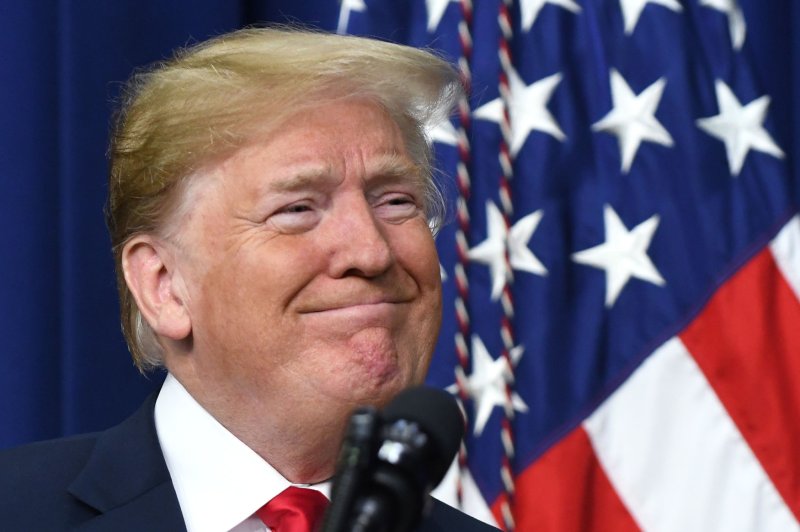President Donald Trump faces a potentially catastrophic battle over the next Supreme Court nomination as he ventures to Brussels for a heads of government NATO summit July 11-12. Photo by Pat Benic/UPI |
License Photo
"Beware the Ides of March" was the warning ignored by Julius Caesar in 44 BC. Today, there is no Caesar in America (yet?). But for those who fear Western democracies are in trouble, July will be a jarring reminder of why those fears may be justified. Certainly for the West, the future is at considerable risk of further deterioration in cohesion within the NATO alliance.
Britain's Prime Minister Theresa May and Germany's Chancellor Angela Merkel are barely hanging onto power. President Donald Trump faces a potentially catastrophic battle over the next Supreme Court nomination as he ventures to Brussels for a heads of government NATO summit July 11-12.
Then the president is off to England, where the welcome mat will be hard to find. His next date before heading home is a rendezvous in Helsinki, Finland with Russian President Vladimir Putin on July 16. Meanwhile in Washington, the announcement of the pending resignation of Supreme Court Justice Anthony Kennedy puts in place the combustants for a nuclear explosion level of debate over his successor.
The exit door for White House Chief of Staff John Kelly is no longer ajar. It is wide open. And the fallout from the primary elections will not have settled, especially the defeat of Joe Crowley in New York's 14th Congressional District, a possible contender for speaker of the House.
Predicting Trump's actions at the NATO summit covers a range of possibilities from tantrums and outrage at the alliance's failure to assume its fair share of spending to reinforcing solidarity and cohesion to strengthen his leverage in the meeting with Putin. The safer bet is to assume the worst and hope for the best. If the G-7 meeting was a precursor of the NATO summit, and NATO is no better than NAFTA to paraphrase the commander-in-chief, this could be one of the most unsatisfactory sessions in alliance history.
That the president's reception in England will be chilly is not helpful. This visit will not even be a shadow of his spectacular trip to Riyadh in early 2017 replete with multi-story posters bearing the president's likeness and sword dances to celebrate the meeting. Word is that because of huge security issues that would shut down London for days, his itinerary may not include that great city --something that no doubt will be perceived as huge slight.
If that happens, the president's mood toward his Western allies will be soured. After all, if the president could quickly turn on his darling Harley-Davidson for moving production overseas, how might he react to his allies' dissatisfaction with his performance and behavior in Brussels and England?
Whether Trump will look into Putin's eyes as he did with Kim Jong Un's and declare that Russia is no longer an enemy remains to be seen. The president seems not to believe that Russia and Putin interfered in our elections despite the preponderance of intelligence and evidence to the contrary. And as North Korea was swiftly downgraded in its danger to the United States, Trump has long argued that working with Russia and China is important. No sensible person would disagree. The question is at what cost.
If the hearings over Supreme Court nominee Clarence Thomas were brutal, nasty and in the justice's own words "a high-tech lynching," should a nominee be named, that debacle will seem absolutely civil and tame by comparison. The Republicans want to move quickly to put an irreversible lock on the court and pave the way ultimately for repeal or neutralization of Roe v. Wade and legalized abortion.
The Democrats furiously recall Majority Leader Mitch McConnell's refusal to permit any consideration of Judge Merrick Garland before the November 2016 elections. Calling Republicans hypocrites for this rush to judgment, the debate not only of whom but how soon the Senate considers the nominee will be fortunate to remain only acrimonious. And the nomination will become a weapon used by both parties to bludgeon the other and could dominate the November Congressional elections.
That means July will be jarring at best and could be far worse. The Senate will remain in session in August, as well. So August could be appalling. And who knows how the remaining months will play out up to and after the election.
Harlan Ullman has served on the Senior Advisory Group for Supreme Allied Commander Europe (2004-16) and is Senior Adviser at Washington D.C.'s Atlantic Council, chairman of two private companies and principal author of the doctrine of shock and awe. A former naval person, he commanded a destroyer in the Persian Gulf and led over 150 missions and operations in Vietnam as a Swift Boat skipper. His latest book is "Anatomy of Failure: Why America Has Lost Every War It Starts." Follow him @harlankullman.















